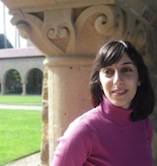On this page:
Current Research
High Q Complex Resonators
Most modern frequency reference applications use micromachined silicon resonators for their attractively high attainable frequency (F) and high quality factor (Q) in a compact and low cost packaging that is also CMOS compatible. A high Q is important for these applications as it directly relates to low motional impedance, phase noise, and power consumption. Our group has previously shown impact of design on (TED limited) Q for our encapsulated resonators. Thermoelastic dissipation (TED) is accounted for by coupling of thermal-mechanical equations. Past results highlight the limits of intuition in identifying the desired thermomechanical coupling even for a simple beam. However, call for higher Q and F has resulted in more complex designs that utilize novel geometries. We demonstrate prediction and control of the (TED limited) quality factor using models that incorporate full thermomechanical coupling in tackling these geometries. We combine detailed modeling with numerical simulations by finite element analysis (FEA) methods and experimental testing to realize our designs full capacity. More »
Quality Factor Effects of Solid-State Silicon (Si) and Silicon Dioxide (SiO2)
A thin film thermal oxidation on the single-crystal-silicon (SCS) base used by our group to make temperature insensitive double-ended tuning forks (DETF) has shown to improve quality factor by 15% to 50%. The gain was attributed to the resonator's improved temperature coefficient of frequency (TCf) by balancing silicon negative coefficient of Young modulus with the positive from SiO2.
However, the impact of coating on the resonator TED is not established. Such impact can be perceived based on entropy generation in the composite device and generalized to more complex geometries, such as our double and quad ring resonators.
Careful crystallographic alignment and thermomechanical conforming of the composite can result in higher Q and more stable resonators. More »
Other Research Interests
- Bulk mode resonators

